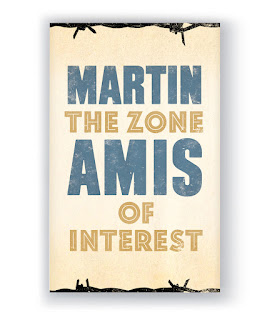Zone of Interest
While it is seemingly obvious in the subheadings, I read some pages of the first chapter before I realised that the novel was changing viewpoints. The main protagonist is ‘Golo’ Thomsen, an intellectual and privileged SS Officer, a skirt-chaser and ultimately a Romantic who turns against the regime. He survives the war largely due to an uncle who is an out-an-out supporter of Hitler and high up in the ranks. Thomsen nevertheless informs on a colleague to the Gestapo, and the reasons for this are not explained (it must be self-preservation, for it does not appear to be zealotry). Thomsen has fallen in love with Hannah Doll, the wife of the Peeping Tom Commandant, Paul Doll. One of Amis’s quirks in characterisation is to make Doll a bumbling fool, capable of the utmost cruelty in order to save face (when his wife hits him and he receives a black eye, he blames his professorial gardener, who is sent straight to the gas chambers).
A third perspective is that of Szmul, a ‘Soderkommando’, the leader of a group of Jewish men who are ‘the saddest men in the history of the world’ – since their work includes deceiving fellow Jews as they arrive at the camp by train, scavenging from the dead, and disposing of bodies. Through Szmul, and through the details around burning, mass murder, brown ash on snow, and the terrible stench, Amis asks the uncomfortable questions about how widely the Final Solution was known. Szmul puts it like this:
A hero, of course, would escape and tell the world. But is my feeling that the world has known for some time. How could it not, given the scale?
Later in the novel, Szmul finds the courage for an heroic act, after he realises that his wife is safely in Hungary (Doll has been manipulating him via threats and a seemingly clear knowledge of her whereabouts in a ghetto).
There are many ways to learn about the Holocaust –through survivor stories, historical recounts, and films. Once I walked around one of the larger camps in the former East Germany, feeling sick to the stomach. Amis’s novel makes you feel this as well, while he delicately draws some sympathy of Thomsen’s character as he plays the double game of appearing to be a dedicated Nazi, while taking part in a minor sabotage of the camp’s industrial machinery. This does not exonerate Thomsen, who reflects on the demise of the regime and what it revealed about participants and victims alike:
Under National Socialism you looked in the mirror and saw your soul. You found yourself out. This applied, par excellence and a fortiori (by many magnitudes), to the victims, or to those who lived for more than an hour and had time to confront their own reflections. And yet it also applied to everyone else, the malefactors, the collaborators, the conspirators, the outright martyrs (Red Orchestra, White Rose, the men and women of July 20), and even minor obstructers, like me, and like Hannah Doll. We all discovered, or helplessly revealed, who we were.
Who somebody really was. That was the zone of interest.
Thomsen – and beyond him, Amis – is careful not to draw a false equivalence when it comes the suffering or self-understanding of the victims of the Nazi regime and the participants and the wider German public. That Germany changed forever, however, is a tragedy in itself, just as a murderer can never undo the action and become once again the young person he once was (in the case of Germany, an artist, a poet, philosopher, musician, sportsman or artisan). Perhaps this what Amis means by finding out who you really are.




Comments
Post a Comment